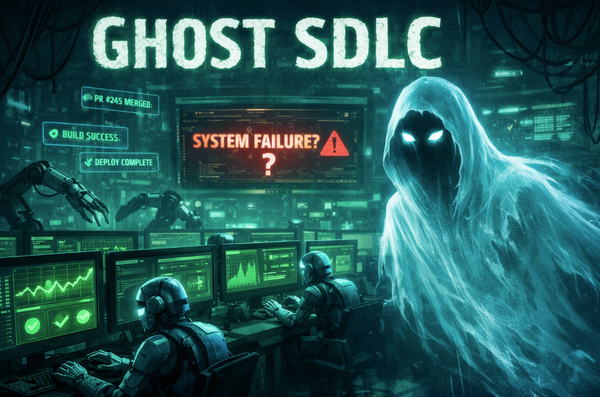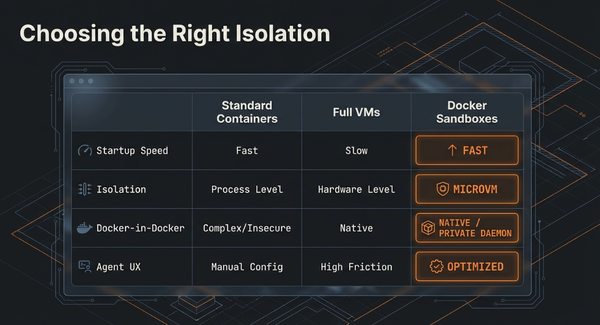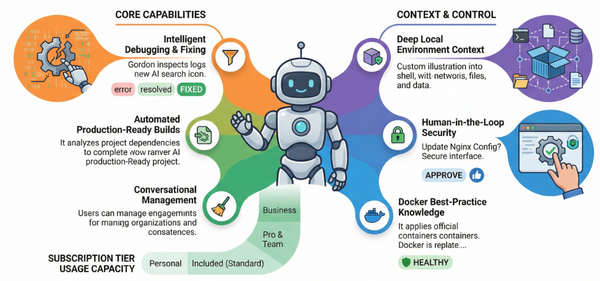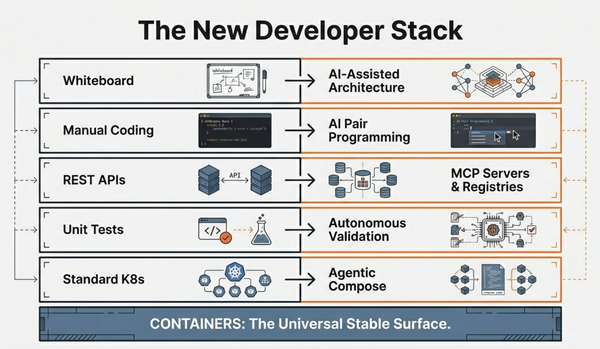Build, Deploy, and Scale AI Agent systems using Docker MCP Gateway and Python
A comprehensive guide to deploying scalable, secure AI agent orchestration using Docker MCP Gateway and Python FastAPI
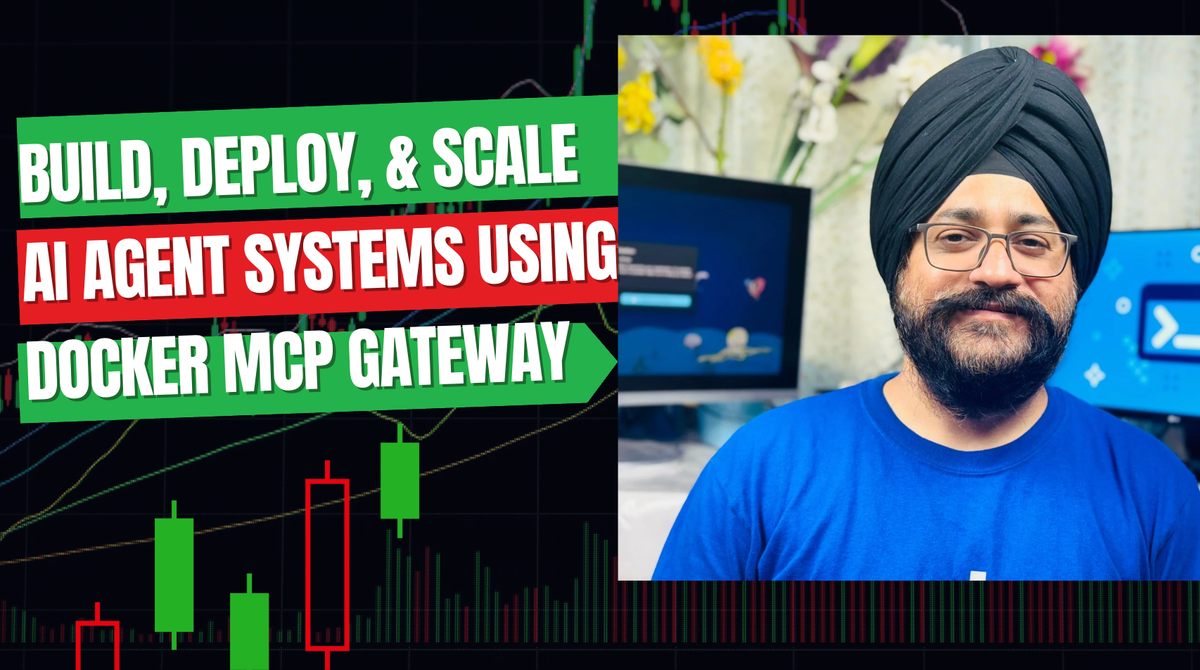
Introduction: The Evolution of AI Agent Architecture
As artificial intelligence continues to revolutionize software development, the need for robust, scalable AI agent systems has become paramount. The Docker MCP Gateway Python project represents a significant advancement in AI agent orchestration, providing developers with a production-ready framework for building intelligent, multi-agent systems that can seamlessly integrate with various data sources and APIs.
This comprehensive guide explores how to build, deploy, and scale AI agent systems using Docker containers, the Model Context Protocol (MCP), and Python FastAPI. Whether you're a DevOps engineer, AI developer, or system architect, this tutorial will help you understand and implement enterprise-grade AI agent infrastructure.
What is Docker MCP Gateway Python?
The Docker MCP Gateway Python is an open-source project that demonstrates how to build a complete AI agent orchestration system using modern containerization and microservices architecture. It combines several cutting-edge technologies:
- Docker MCP Gateway: Secures and orchestrates MCP servers
- FastAPI-based Agent Service: Handles agent logic and communication
- Multi-Agent Architecture: Specialized agents for different tasks
- Container Security: Enterprise-grade secret management
- Web Interface: User-friendly interaction layer
Key Features
🔐 Enterprise Security
- Docker secrets for credential management
- Container isolation for each MCP server
- No plaintext secrets in configuration files
🤖 Intelligent Agent System
- GitHub Repository Analyst
- Research Assistant with web search capabilities
- Content Creator with file operations
🔧 Advanced Orchestration
- Dynamic MCP server management
- Intelligent data interceptors
- CSV formatting for GitHub issues
- Response optimization for AI consumption
📊 Production Architecture
- Docker Compose orchestration
- Health checks and restart policies
- Scalable microservices design
- API-first architecture
Technical Architecture Deep Dive
The system follows a sophisticated microservices architecture that ensures scalability, security, and maintainability:
┌─────────────────┐ ┌─────────────────┐ ┌─────────────────┐
│ Web UI │ │ Agent API │ │ MCP Gateway │
│ (Port 3000) │───▶│ (Port 7777) │───▶│ (Port 8811) │
└─────────────────┘ └─────────────────┘ └─────────────────┘
│
┌─────────▼─────────┐
│ Docker API Socket │
│ Dynamic MCP │
│ Server Management │
└───────────────────┘
│
┌───────────────────┼───────────────────┐
▼ ▼ ▼
┌─────────────┐ ┌─────────────┐ ┌─────────────┐
│ GitHub │ │ Brave │ │ Wikipedia │
│ MCP Server │ │ MCP Server │ │ MCP Server │
└─────────────┘ └─────────────┘ └─────────────┘Component Breakdown
1. MCP Gateway (Port 8811) The central orchestration component that:
- Manages secure communication with MCP servers
- Handles authentication and authorization
- Provides intelligent data interceptors
- Offers dynamic server management via Docker API
2. Agent API Service (Port 7777) FastAPI-based service that:
- Processes agent requests and responses
- Manages agent configurations
- Orchestrates tool usage
- Interfaces with AI models
3. Web UI (Port 3000) React-based interface providing:
- User-friendly agent interaction
- Real-time chat interface
- Agent selection and configuration
- Response visualization
4. MCP Servers Specialized servers for different data sources:
- GitHub MCP Server: Repository analysis, issue tracking
- Brave MCP Server: Web search capabilities
- Wikipedia MCP Server: Knowledge base access
Agent System Configuration
Agent Specializations
The system includes three specialized agents, each optimized for specific use cases:
1. GitHub Repository Analyst
github-analyst:
name: "GitHub Repository Analyst"
model: qwen3-medium
tools:
- list_issues
- get_repository_info
- brave_web_search
system_prompt: |
You are an expert GitHub analyst. Provide strategic insights,
trend analysis, and actionable recommendations based on repository data.
Combine GitHub metrics with web research for comprehensive analysis.Use Cases:
- Repository health assessment
- Issue trend analysis
- Contributor activity monitoring
- Strategic development insights
2. Research Assistant
research-assistant:
name: "Research Assistant"
model: qwen3-small
tools:
- brave_web_search
- get_article
- list_issues
system_prompt: |
You are a research specialist. Combine web search, Wikipedia, and
GitHub data to provide comprehensive, well-sourced analysis.
Always cite your sources and provide balanced perspectives.Use Cases:
- Market research
- Technology trend analysis
- Competitive intelligence
- Academic research support
3. Content Creator
content-creator:
name: "Content Creator"
model: qwen3-small
tools:
- brave_web_search
- get_article
- read_file
- write_file
system_prompt: |
You are a content creator. Research topics thoroughly and create
well-structured content. Save your work to files for review.
Focus on clear, engaging, and informative writing.Use Cases:
- Technical documentation
- Blog post creation
- Research report generation
- Content strategy development
Implementation Guide
Prerequisites
Before deploying the Docker MCP Gateway Python system, ensure you have:
- Docker Desktop 4.43+ or Docker Engine with Compose
- GPU support (recommended) or Docker Offload access
- API keys for external services:
- GitHub Personal Access Token
- Brave Search API Key
- OpenAI API Key (optional)
Step 1: Environment Setup
Clone the repository and set up your environment:
git clone https://github.com/ajeetraina/docker-mcp-gateway-python
cd docker-mcp-gateway-python
# Create environment file
cp .mcp.env.example .mcp.envStep 2: Security Configuration
Configure your API credentials in .mcp.env:
# Required for GitHub analysis
GITHUB_TOKEN=ghp_your_github_personal_access_token
# Required for web search capabilities
BRAVE_API_KEY=your_brave_search_api_key
# Optional: For OpenAI models instead of local models
OPENAI_API_KEY=sk-your_openai_api_keySecurity Best Practices:
- Use Docker secrets for credential management
- Never commit API keys to version control
- Implement proper access controls
- Regular token rotation
Step 3: Docker Compose Architecture
The compose.yaml file defines a sophisticated multi-service architecture:
services:
# MCP Gateway - Central orchestration
mcp-gateway:
image: docker/mcp-gateway:latest
ports:
- "8811:8811"
use_api_socket: true
command:
- --transport=streaming
- --secrets=/run/secrets/mcp_secret
- --servers=github-official,brave,wikipedia-mcp
- --interceptor
- "after:exec:cat | jq '.content[0].text = (.content[0].text | fromjson | map(select(. != null) | [(.number // \"\"), (.state // \"\"), (.title // \"\"), (.user.login // \"\"), ((.labels // []) | map(.name) | join(\";\")), (.created_at // \"\")] | @csv) | join(\"\\n\"))'"
volumes:
- /var/run/docker.sock:/var/run/docker.sock
secrets:
- mcp_secretKey Configuration Features:
- Dynamic Server Management: Uses Docker API socket
- Intelligent Interceptors: CSV formatting for GitHub data
- Secure Secret Management: Docker secrets integration
- Verbose Logging: Enhanced debugging capabilities
Step 4: Agent Service Implementation
The FastAPI-based agent service (agent/app.py) provides the core orchestration logic:
class AIAgentService:
def __init__(self):
self.mcp_gateway_url = os.getenv("MCPGATEWAY_URL", "http://mcp-gateway:8811")
self.model_runner_url = os.getenv("MODEL_RUNNER_URL", "http://model-runner:8080")
self.agents_config = self.load_agents_config()
self.session = httpx.AsyncClient(timeout=30.0)
async def call_mcp_tool(self, tool_name: str, arguments: Dict[str, Any]) -> Dict[str, Any]:
"""Call MCP tool through the gateway"""
payload = {
"jsonrpc": "2.0",
"id": 1,
"method": "tools/call",
"params": {
"name": tool_name,
"arguments": arguments
}
}
response = await self.session.post(
f"{self.mcp_gateway_url}/mcp",
json=payload
)
return response.json()Service Features:
- Asynchronous Processing: Non-blocking operations
- Tool Orchestration: Dynamic MCP tool selection
- Error Handling: Robust exception management
- Configuration Management: YAML-based agent definitions
Step 5: Deployment and Testing
Start the complete system:
# Deploy all services
docker compose up -d
# Verify deployment
docker compose ps
# Monitor logs
docker compose logs -fTest the API endpoints:
# List available agents
curl http://localhost:7777/agents
# Interact with GitHub analyst
curl -X POST http://localhost:7777/chat \
-H "Content-Type: application/json" \
-d '{
"agent_name": "github-analyst",
"message": "Analyze the Docker MCP Gateway repository",
"tools": ["list_issues", "brave_web_search"]
}'Advanced Features and Customization
Model Configuration
The system supports multiple AI models with different capabilities:
=
models:
qwen3-small:
model: ai/qwen3:8B-Q4_0 # 4.44 GB - Efficient for most tasks
context_size: 15000 # 7 GB VRAM required
qwen3-medium:
model: ai/qwen3:14B-Q6_K # 11.28 GB - Enhanced capabilities
context_size: 15000 # 15 GB VRAM requiredModel Selection Considerations:
- Resource Requirements: Balance performance vs. hardware constraints
- Context Size: Larger contexts for complex analysis
- Task Specialization: Match model capabilities to agent requirements
Custom Agent Development
Create custom agents by extending the configuration:
custom-analyst:
name: "Custom Data Analyst"
model: qwen3-medium
tools:
- brave_web_search
- custom_data_processor
- visualization_generator
system_prompt: |
You are a specialized data analyst. Focus on extracting insights
from complex datasets and presenting findings in clear,
actionable formats. Use visualizations when appropriate.MCP Server Extension
Add new MCP servers for additional data sources:
command:
- --servers=github-official,brave,wikipedia-mcp,slack-mcp,jira-mcpPerformance Optimization
Resource Management
Memory Optimization:
- Configure appropriate model context sizes
- Implement request batching for high-volume scenarios
- Use connection pooling for database operations
GPU Utilization:
- Enable GPU acceleration for model inference
- Implement model sharing across agents
- Optimize memory allocation patterns
Scaling Strategies
Horizontal Scaling:
- Deploy multiple agent service instances
- Implement load balancing
- Use container orchestration platforms (Kubernetes)
Vertical Scaling:
- Increase container resource limits
- Optimize model configurations
- Implement caching strategies
Production Deployment Considerations
Security Hardening
Container Security:
- Use minimal base images
- Implement security scanning
- Regular vulnerability assessments
- Network segmentation
Access Control:
- API authentication and authorization
- Role-based permissions
- Audit logging
- Rate limiting
Monitoring and Observability
Key Metrics:
- Agent response times
- Tool utilization rates
- Error rates and patterns
- Resource consumption
Logging Strategy:
- Structured logging formats
- Centralized log aggregation
- Alert configurations
- Performance monitoring
Backup and Recovery
Data Protection:
- Agent configuration backups
- Model checkpoint management
- Database replication
- Disaster recovery procedures
Use Cases and Applications
Enterprise Applications
1. DevOps Automation
- Automated code review analysis
- CI/CD pipeline optimization
- Infrastructure monitoring insights
- Security vulnerability assessment
2. Business Intelligence
- Market research automation
- Competitive analysis
- Customer sentiment analysis
- Strategic planning support
3. Content Operations
- Automated documentation generation
- Technical writing assistance
- Marketing content creation
- Knowledge base maintenance
Development Workflows
1. Repository Management
- Issue prioritization
- Pull request analysis
- Code quality assessment
- Contributor insights
2. Research and Development
- Technology trend analysis
- Open source intelligence
- Patent research
- Academic literature review
Troubleshooting Common Issues
Container Startup Problems
Issue: MCP Gateway fails to start
Solution:
# Check Docker socket permissions
sudo chmod 666 /var/run/docker.sock
# Verify secret file exists
ls -la .mcp.env
# Check logs for specific errors
docker compose logs mcp-gatewayAPI Connection Issues
Issue: Agent service cannot connect to MCP Gateway
Solution:
# Verify network connectivity
docker compose exec agents ping mcp-gateway
# Check port configurations
docker compose ps
# Validate environment variables
docker compose exec agents env | grep MCPGATEWAY_URLModel Performance Issues
Issue: Slow response times
Solution:
- Reduce context size in model configuration
- Implement request caching
- Optimize tool selection logic
- Consider GPU acceleration
Conclusion
The Docker MCP Gateway Python project represents a significant advancement in AI agent orchestration technology. By combining Docker containerization, the Model Context Protocol, and modern microservices architecture, it provides developers with a robust, scalable foundation for building intelligent agent systems.
Key benefits include:
- Production-Ready Architecture: Enterprise-grade security and scalability
- Flexible Agent System: Customizable agents for diverse use cases
- Comprehensive Integration: Support for multiple data sources and APIs
- Modern Development Practices: Container-based deployment and CI/CD compatibility
Whether you're building internal tooling, customer-facing applications, or research platforms, this system provides the foundation for creating sophisticated AI-powered solutions that can grow with your organization's needs.
As AI continues to evolve, systems like Docker MCP Gateway Python will play a crucial role in making advanced AI capabilities accessible, secure, and scalable for organizations of all sizes. The future of AI agent orchestration is here, and it's built on the solid foundation of container technology and modern software engineering practices.
